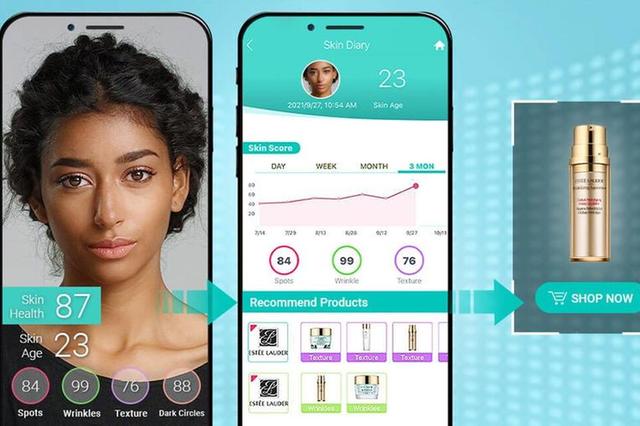Beauty Tech, is an emerging new tech trend encompassing AI and AR-powered virtual try-on technologies and diagnostics that has already helped hundreds of beauty brands grow their sales figures dramatically while increasing customer engagement and brand visibility.
Cosmetics and humans have a very long history. Egyptians, 7,000 years ago, saw beauty as a sign of holiness, using copper carbonate to create green eyeshade as just one example. To the Greek philosopher Plato, beauty was indistinguishable from philosophy, while the ancient Chinese pioneered fingernail painting. Tribes in Africa—as elsewhere—have used face paints and other elements of cosmetics to denote affiliation, roles, and status and across the years, poets, painters, and philosophers have weighed in on the role of beauty in cultures around the world. Virtually everywhere, cosmetics in one form or another, for both men and women, have played a role. While the birth of Beauty Tech can be traced back to early paint and photoshopping applications on desktop computers, it really took off with the more recent advent of AI and AR technologies, literally changing the world of beauty as we once knew it.
“Although beauty tech dates back to the days of boxed computer programs, it’s only recently that big brands have started to invest heavily in the space.’ Said Founder and CEO of Perfect Corp., Alice Chang. ‘The surge in interest has been driven in large part by advances in smartphone technology and the development of advanced beauty tech solutions such as Perfect Corp.’s AR virtual try-on solution for makeup and AI skin diagnostic technologies for skincare brands. Consumers now have their smartphone with them at all times, and through the power of beauty tech, can snap a photo to try on makeup shades and receive a personalized beauty recommendations in seconds.’
Today, beauty is not one size fits all, and when consumers shop for new makeup products, they are seeking out personalized advice and recommendations from brands. The power of AR and AI technology for beauty brands lies within its ability to cater to individual consumers and their specific beauty needs and the deep learning algorithms that drive AR and AI beauty tech has really helped brands provide mass-scale personalization to its consumers. With these technologies, every customer can try-on products virtually, at the touch of a button, and receive a personalized product recommendations and regimen.
According to a recent study by Forrester, 77% of consumers have chosen, recommended, or paid more for a brand that provides a personalized service or experience. Forbes also recently reported that an astounding 71% of consumers feel frustrated when shopping experiences are not personalized to their unique needs. From this data, it is clear that beauty tech tools and personalization strategies are becoming essential to create strong customer experiences and shopping journeys and ultimately, have to available in order to ensure the success of both emerging and established beauty brands.
“AI and AR technology is fast becoming a crucial part of a beauty brand’s digital transformation strategy and beauty tech innovations, as more shoppers become accustomed to shopping online and seek out more opportunities for personalization,” reiterates Alice Chang. Continuing, she says, “Virtual try-on and personalized product recommendations not only help to boost consumer confidence when making purchase decisions, but also gives brands and retailers a chance to reimagine their consumer journey.”
AR technologies such as the virtual try-on solutions provided by Perfect Corp. are becoming essential to entertain and engage beauty consumers along the shopping journey. Consumers are turning to digital channels for beauty product advice and inspiration more than ever before. In 2021 alone, there have been billions of virtual makeup looks tried-on digitally in Perfect Corp.’s YouCam Makeup app. As the world emerges from the pandemic, try-before-you-buy experiences are integral for creating personalized and engaging shopping experiences that drive purchasing confidence. AR virtual try-on technology has undergone major advancements over the years and now allows beauty brands to enable interactive and hyper-realistic digital experiences across the entire range of color cosmetics products, including lipstick, eye shadow, eyebrow, eyeliner, mascara, blush, highlighter, and foundation.

